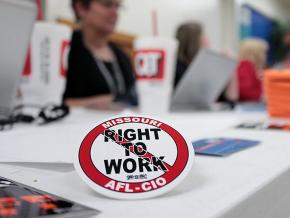Resisting the right-to-starve in Missouri
The campaign to repeal Missouri’s “right-to-work” law in an August 7 ballot referendum should be seen as an opportunity to broaden labor’s appeal, writes .
THE MISSOURI Republican Party and the billionaires who back them are determined to keep Missouri a “right-to-starve” state by trying to undermine a union-led effort to repeal the state’s “right-to-work” (RTW) law.
In February 2017, Missouri’s Republican-controlled legislature passed RTW legislation fast on the heels of the November 2016 election of Republican Gov. Eric Greitens.
In May, Greitens resigned amid a sex scandal involving a relationship with his hairdresser and an explicit photograph he took. Greitens also faced accusations that he improperly used for political purposes the donor rolls of his charity, The Mission Continues, which raises money to support veterans transitioning to civilian life.
The 2016 election provided the Republicans with a supermajority at the state level which it desperately needed to ram through the anti-worker legislation. Except for Illinois, all of the states surrounding Missouri have already passed RTW laws. RTW has been a top legislative priority for bosses and the Republicans since Kansas first passed such a law in 1958.

After passage of RTW legislation by the Missouri legislature, the state’s unions collected 310,567 signatures — more than triple the number required — to get a referendum on repealing the law on the November 2018 ballot.
In response, the state’s Republican lawmakers accelerated the timetable, putting the referendum on the August 7 primary ballot. They feared that the expected larger turnout in the November general election would make repeal of the RTW law more likely.
RTW laws are explicitly designed to do two things: destroy unions and lower wages for all workers. The laws end requirements that workers in a unionized workplace either join the union or pay “fair share” fees toward the benefits they receive from working under the collective bargaining agreement.
By depriving unions of income and making them work harder to collect dues from those who opt to pay them, RTW laws are meant to starve unions of the resources they need to vigorously represent the interests of their members. By weakening unions, it makes it easier for employers to drive down wages and benefits.
Employers and politicians who support the law say it’s a matter of giving workers a “choice.”
Needless to say, this “choice” doesn’t include where profits go, if your workplace is safe to work in, if you’ll be able to retire, or if your insurance covers 100 percent of emergency room visits.
According to a 2015 report by the Economic Policy Institute, “average hourly wages are 15.8 percent higher in non-RTW states” and “nonunion wages are higher in more unionized industries and regions.” And because union representation helps women and people of color secure equality on the job, RTW disproportionately harms these sections of the working class.
WHO’S BEHIND RTW and Prop A in Missouri? The gaggle of right-wing RTW advocates is a who’s who list of Missouri’s free-market fanatics, with no shortage of the word “freedom” in their names.
There’s Grover Norquist’s Center For Worker Freedom, a special project of Americans for Tax Reform; Missourians for Worker Freedom; the Show Me Institute, a free-market lobby group led by billionaire Klan sympathizer Rex Siquefield; and the Missouri Alliance for Freedom. All these “freedom lovers” have spent millions of dollars in an effort to demolish unions and wages in Missouri.
The political action committees and think tanks advocating for a “yes” vote on Prop A have raised $3.1 million. Another group backing the law, the Liberty Alliance, has taken large donations from prominent Joplin, Missouri, mega-donor David Humphreys, the Herzog family of St. Joseph, and Wisconsin businessman Richard Uihlein.
So let’s summarize: Greitens’ nonprofit The Mission Continues raises millions of dollars for veterans who are “adjusting to life at home,” which he then funnels into his 2016 election campaign and the formation of a supposedly independent “dark money” group A New Missouri.
After Greitens’ election, A New Missouri writes checks to the personal businesses of Missouri Republican operatives and funnels money into Freedom To Work and Missourians for Worker Freedom in an effort to ram through RTW laws.
During all of this, there are millions of dollars pouring into various political funds from billionaires and corporations outside of Missouri. All this money, organization and propaganda is designed to make RTW the law in Missouri.
This is just one front in the full-spectrum assault on workers’ rights over the last 40 years. While the Trump administration appoints one reactionary anti-worker figure after another, the Democratic Party and union leaders within the AFL-CIO have, by and large, sought a “labor peace” that remains palatable to billionaires.
This helps explain why the minimum wage in the U.S. today is only 71 percent of what it was in 1978 (in inflation-adjusted terms). Since 1978, the average worker’s wages have grown only 10.9 percent, according to a 2014 study by the Economic Policy Institute, while CEOs on average now make more than 300 times what typical workers earn.
So far, the response to Prop A from labor has come from the AFL-CIO sponsored We Are Missouri. We Are Missouri has started a door-to-door campaign to organize for a “no” vote.
Pushing back against RTW in Missouri should also be an opportunity to draw together broader forces to not only vote against the attack on workers, but rebuild the left and the labor movement.
The teachers’ strike wave in already RTW states, from West Virginia to Arizona, should serve as an example to Missouri workers that working people are ready and willing to stand up for dignity on the job.
So vote no on Prop A on August 7 — and take the opportunity to talk to everyone about the need to build a pro-worker movement in Missouri and across the U.S.


